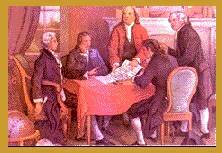|
PinkMonkey Online Study Guide-World History
5.3 Application of the Critical Spirit
With the spread of rationalism, philosophers began
to attack the problems of religion and morality. They not only criticized
the state, society and the Church, but also tried to point the way
to a more progressive way of life by applying rationalism to all
phases of life.
Religion
More stress was laid on doing ’good works’ rather
than on faith in the religious field, thanks to the rise of the
humanitarian spirit. Slavery was criticized. There was demand for
prison reform. The idea of religious toleration grew, while religious
persecution declined. These problems were shared by both the Catholics
and the Protestants.
Politics
In the political sphere, autocracy was criticized
and pleas were made for personal liberties in some of the writings
of John Milton, for example.
The English Petition of Rights (1628), the
American Declaration of Independence (1776) and other famous
documents were evidence of substantial gains for liberty.

Exhibit 5.4
The Declaration Committee
The most notable speakers for the people and against
the kings were the Englishman John Locke as well as the Frenchmen
Charles Montesquieu and Jean Jacques Rousseau, who
were highly influenced by Locke in the 17thcentury. Locke argued
that all governments exist or should exist by the consent of the
governed.
|